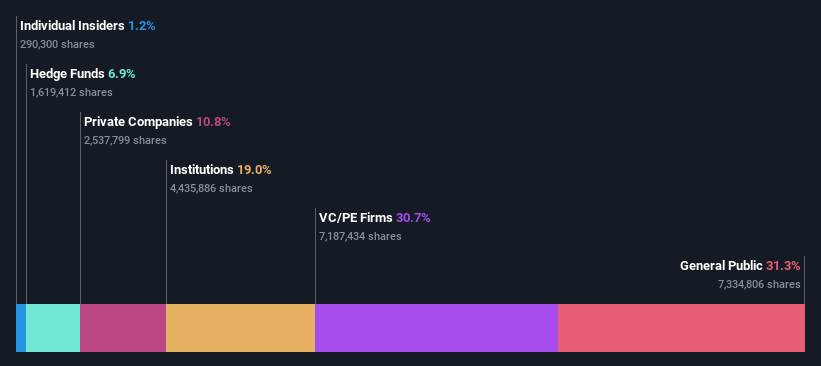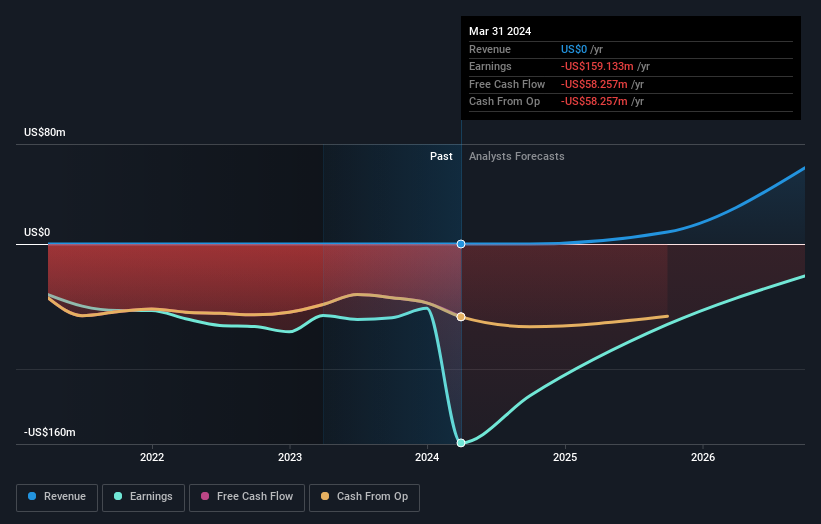Outlook Therapeutics, Inc.'s (NASDAQ:OTLK) largest shareholders are individual investors with 31% ownership, private equity firms own 31%
Key Insights
The considerable ownership by individual investors in Outlook Therapeutics indicates that they collectively have a greater say in management and business strategy
A total of 6 investors have a majority stake in the company with 52% ownership
A look at the shareholders of Outlook Therapeutics, Inc. (NASDAQ:OTLK) can tell us which group is most powerful. And the group that holds the biggest piece of the pie are individual investors with 31% ownership. In other words, the group stands to gain the most (or lose the most) from their investment into the company.
And private equity firms on the other hand have a 31% ownership in the company.
In the chart below, we zoom in on the different ownership groups of Outlook Therapeutics.
Check out our latest analysis for Outlook Therapeutics
What Does The Institutional Ownership Tell Us About Outlook Therapeutics?
Institutions typically measure themselves against a benchmark when reporting to their own investors, so they often become more enthusiastic about a stock once it's included in a major index. We would expect most companies to have some institutions on the register, especially if they are growing.
Outlook Therapeutics already has institutions on the share registry. Indeed, they own a respectable stake in the company. This can indicate that the company has a certain degree of credibility in the investment community. However, it is best to be wary of relying on the supposed validation that comes with institutional investors. They too, get it wrong sometimes. If multiple institutions change their view on a stock at the same time, you could see the share price drop fast. It's therefore worth looking at Outlook Therapeutics' earnings history below. Of course, the future is what really matters.
It would appear that 6.9% of Outlook Therapeutics shares are controlled by hedge funds. That catches my attention because hedge funds sometimes try to influence management, or bring about changes that will create near term value for shareholders. Our data shows that GMS Ventures & Investments is the largest shareholder with 25% of shares outstanding. Meanwhile, the second and third largest shareholders, hold 7.3% and 6.9%, of the shares outstanding, respectively. Additionally, the company's CEO C. Trenary directly holds 0.7% of the total shares outstanding.
On further inspection, we found that more than half the company's shares are owned by the top 6 shareholders, suggesting that the interests of the larger shareholders are balanced out to an extent by the smaller ones.
While it makes sense to study institutional ownership data for a company, it also makes sense to study analyst sentiments to know which way the wind is blowing. There are a reasonable number of analysts covering the stock, so it might be useful to find out their aggregate view on the future.
Insider Ownership Of Outlook Therapeutics
While the precise definition of an insider can be subjective, almost everyone considers board members to be insiders. Company management run the business, but the CEO will answer to the board, even if he or she is a member of it.
Most consider insider ownership a positive because it can indicate the board is well aligned with other shareholders. However, on some occasions too much power is concentrated within this group.
Our most recent data indicates that insiders own some shares in Outlook Therapeutics, Inc.. As individuals, the insiders collectively own US$2.2m worth of the US$177m company. This shows at least some alignment, but we usually like to see larger insider holdings. You can click here to see if those insiders have been buying or selling.
General Public Ownership
The general public, who are usually individual investors, hold a 31% stake in Outlook Therapeutics. While this group can't necessarily call the shots, it can certainly have a real influence on how the company is run.
Private Equity Ownership
Private equity firms hold a 31% stake in Outlook Therapeutics. This suggests they can be influential in key policy decisions. Some might like this, because private equity are sometimes activists who hold management accountable. But other times, private equity is selling out, having taking the company public.
Private Company Ownership
Our data indicates that Private Companies hold 11%, of the company's shares. It's hard to draw any conclusions from this fact alone, so its worth looking into who owns those private companies. Sometimes insiders or other related parties have an interest in shares in a public company through a separate private company.
Next Steps:
It's always worth thinking about the different groups who own shares in a company. But to understand Outlook Therapeutics better, we need to consider many other factors. Case in point: We've spotted 4 warning signs for Outlook Therapeutics you should be aware of, and 3 of them are concerning.
But ultimately it is the future, not the past, that will determine how well the owners of this business will do. Therefore we think it advisable to take a look at this free report showing whether analysts are predicting a brighter future.
NB: Figures in this article are calculated using data from the last twelve months, which refer to the 12-month period ending on the last date of the month the financial statement is dated. This may not be consistent with full year annual report figures.
Have feedback on this article? Concerned about the content? Get in touch with us directly. Alternatively, email editorial-team (at) simplywallst.com.
This article by Simply Wall St is general in nature. We provide commentary based on historical data and analyst forecasts only using an unbiased methodology and our articles are not intended to be financial advice. It does not constitute a recommendation to buy or sell any stock, and does not take account of your objectives, or your financial situation. We aim to bring you long-term focused analysis driven by fundamental data. Note that our analysis may not factor in the latest price-sensitive company announcements or qualitative material. Simply Wall St has no position in any stocks mentioned.
Have feedback on this article? Concerned about the content? Get in touch with us directly. Alternatively, email editorial-team@simplywallst.com

 Yahoo Finance
Yahoo Finance 

